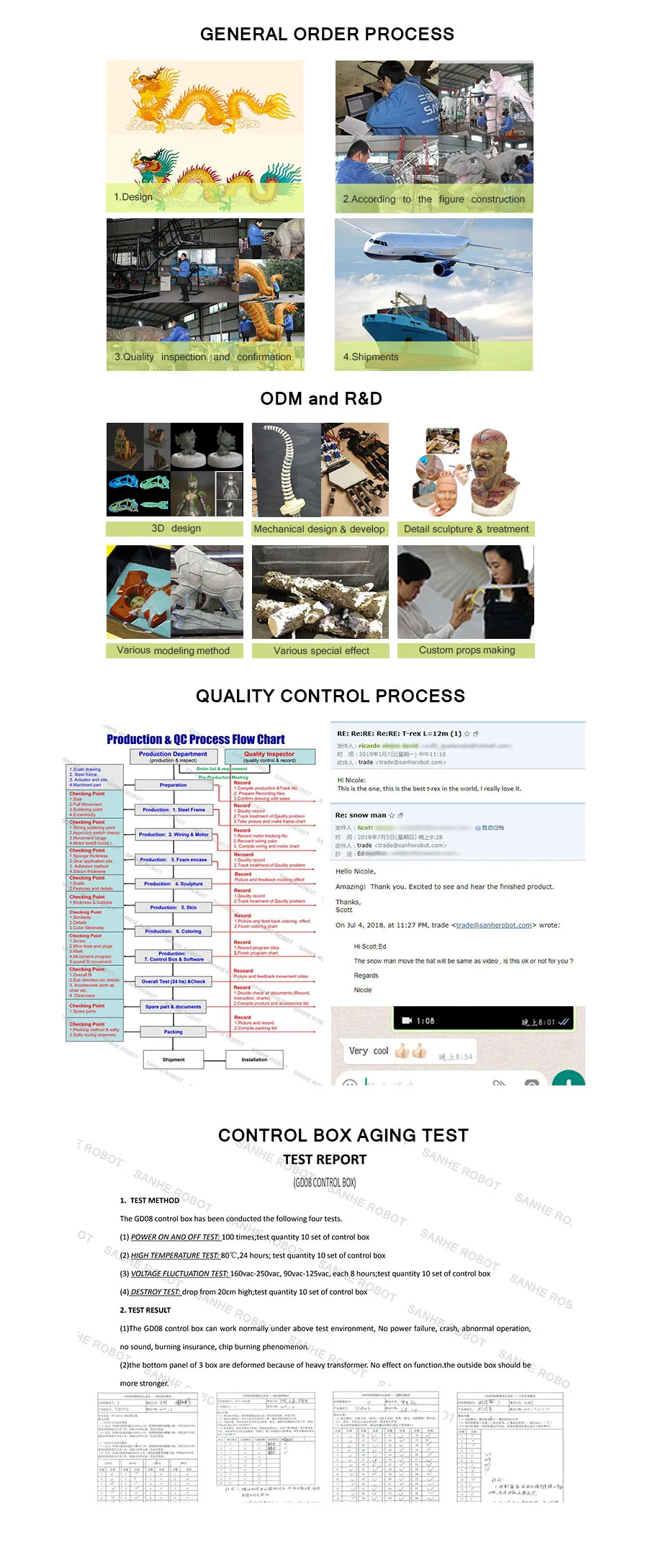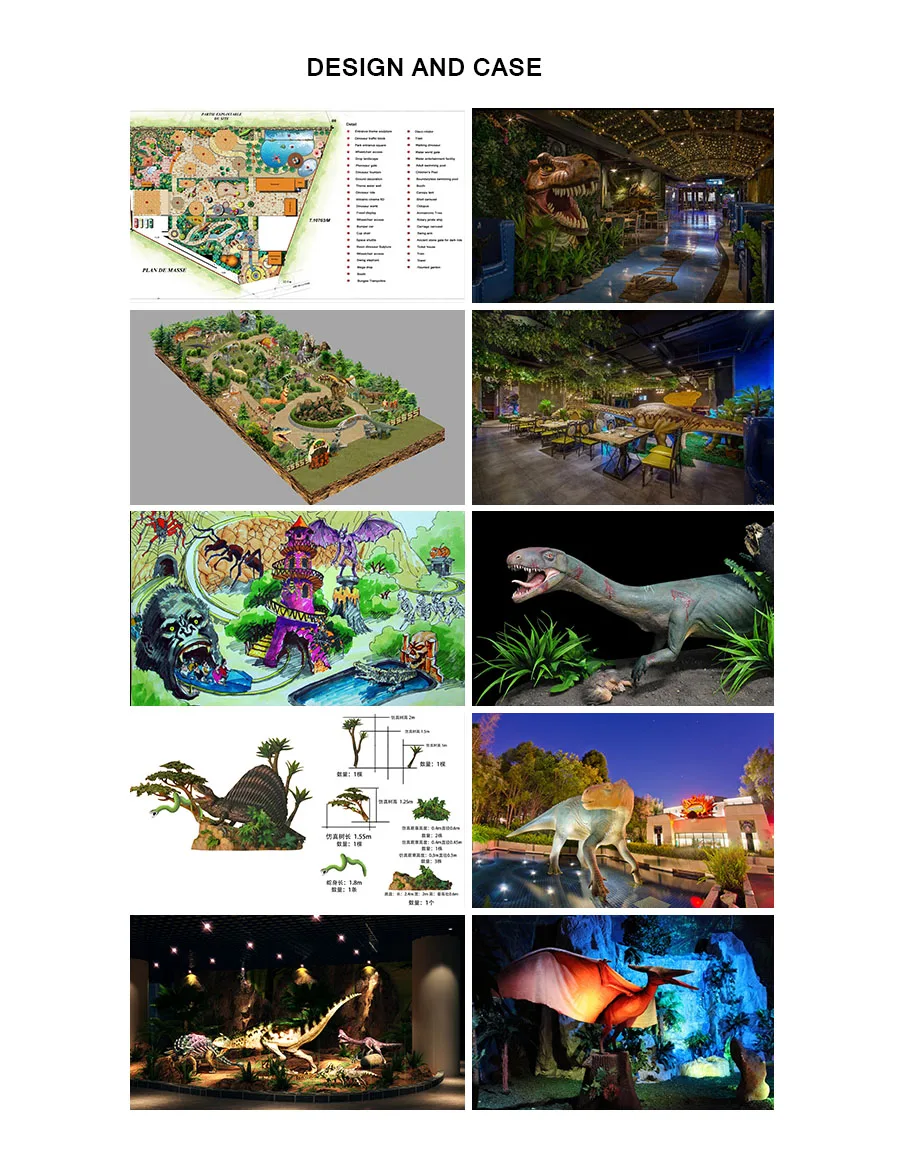Theme park decoration animatronics large animal Macrauchenia for sale 

MORE INFORMATION
| Input | AC 110/220V ,50-60HZ |
| Plug | Euro plug / British Standard / SAA / C-UL / or depends on request |
| Control mode | Automatic / Infrared / remote / coin / Button / Voice / Touch / Temperature / shooting etc. |
| Waterproofing grade | IP66 |
| Working condition | Sunshine, rain, seaside, 0~50℃(32℉~82℉) |
| Optional function | Sound can be increased to 128 kinds Smoke,/ water. / bleed / smell / change color / change lights / LED screen etc interactive(Location tracking) / conversine(currently only Chinese) |
AFTER-SALE SERVICE
| Service | Need be cut for shipping,fwill provide a detailed installation manual. |
| Warranty | We provide 2 years warranty for all of our antrimatronic models, the warranty pieriod starts from freight arrives at destination port. Our warranty covers motor, reducer, control box, etc. |






 park decoration,simulation animal,life size animal,animatronic animal
realistic animals amusement park animals realistic animals robotic animal statue handmade animal statue playground animal statue animatronic animal lifelike animal life size animatronic animal statues animal statues for sale animal playground equipment playground equipment exhibition display zoo exhibition animal model lifelike animal model animatronics animal model african animal sculptures prehistoric animal
Macrauchenia ("long llama", based on the now-invalid llama genus, Auchenia, from Greek "big neck") was a large, long-necked and long-limbed, three-toed native South American mammal in the order Litopterna.[1] The genus gives its name to its family, the Macraucheniidae or "robust litopterns". Like other litopterns, it is most closely related to the odd-toed ungulates (Perissodactyla), from which litopterns diverged approximately 66 million years ago. The oldest fossils in the genus date to the late Miocene, around seven million years ago, and M. patachonica disappears from the fossil record during the late Pleistocene, around 20,000-10,000 years ago. M. patachonica is one of the last and best known member of the family and is known primarily from the Luján Formation in Argentina, but is known from localities across southern South America. Another genus of macraucheniid Xenorhinotherium was present in northeast Brazil and Venezuela during the Late Pleistocene. The type specimen was discovered by Charles Darwin during the voyage of the Beagle. In life, Macrauchenia may have resembled a humpless camel, though the two taxa are not closely related.[2] It fed on plants in a variety of environments across what is now South America. Among the species described, M. patachonica and M. ullomensis are considered valid; M. boliviensis is considered a nomen dubium; and M. antiqua (or M. antiquus) has been moved to the genus Promacrauchenia
Macrauchenia fossils were first collected on 9 February 1834 at Port St Julian in Patagonia (Argentina) by Charles Darwin, when HMS Beagle was surveying the port.[3] As a non-expert he tentatively identified the leg bones and fragments of spine he found as "some large animal, I fancy a Mastodon". In 1837, soon after the Beagle's return, the anatomist Richard Owen identified the bones, including vertebrae from the back and neck, as from a gigantic creature resembling a llama or camel, which Owen named Macrauchenia patachonica.[4] In naming it, Owen noted the original Greek terms μακρο? (makros, large or long), and αυχην (auchèn, neck) as used by Illiger as the basis of Auchenia as a generic name for the llama, Vicugna and so on.[5] The find was one of the discoveries leading to the inception of Darwin's theory. Since then, more Macrauchenia fossils have been found, mainly in Patagonia, but also in Bolivia, Chile and Venezuela
park decoration,simulation animal,life size animal,animatronic animal
realistic animals amusement park animals realistic animals robotic animal statue handmade animal statue playground animal statue animatronic animal lifelike animal life size animatronic animal statues animal statues for sale animal playground equipment playground equipment exhibition display zoo exhibition animal model lifelike animal model animatronics animal model african animal sculptures prehistoric animal
Macrauchenia ("long llama", based on the now-invalid llama genus, Auchenia, from Greek "big neck") was a large, long-necked and long-limbed, three-toed native South American mammal in the order Litopterna.[1] The genus gives its name to its family, the Macraucheniidae or "robust litopterns". Like other litopterns, it is most closely related to the odd-toed ungulates (Perissodactyla), from which litopterns diverged approximately 66 million years ago. The oldest fossils in the genus date to the late Miocene, around seven million years ago, and M. patachonica disappears from the fossil record during the late Pleistocene, around 20,000-10,000 years ago. M. patachonica is one of the last and best known member of the family and is known primarily from the Luján Formation in Argentina, but is known from localities across southern South America. Another genus of macraucheniid Xenorhinotherium was present in northeast Brazil and Venezuela during the Late Pleistocene. The type specimen was discovered by Charles Darwin during the voyage of the Beagle. In life, Macrauchenia may have resembled a humpless camel, though the two taxa are not closely related.[2] It fed on plants in a variety of environments across what is now South America. Among the species described, M. patachonica and M. ullomensis are considered valid; M. boliviensis is considered a nomen dubium; and M. antiqua (or M. antiquus) has been moved to the genus Promacrauchenia
Macrauchenia fossils were first collected on 9 February 1834 at Port St Julian in Patagonia (Argentina) by Charles Darwin, when HMS Beagle was surveying the port.[3] As a non-expert he tentatively identified the leg bones and fragments of spine he found as "some large animal, I fancy a Mastodon". In 1837, soon after the Beagle's return, the anatomist Richard Owen identified the bones, including vertebrae from the back and neck, as from a gigantic creature resembling a llama or camel, which Owen named Macrauchenia patachonica.[4] In naming it, Owen noted the original Greek terms μακρο? (makros, large or long), and αυχην (auchèn, neck) as used by Illiger as the basis of Auchenia as a generic name for the llama, Vicugna and so on.[5] The find was one of the discoveries leading to the inception of Darwin's theory. Since then, more Macrauchenia fossils have been found, mainly in Patagonia, but also in Bolivia, Chile and Venezuela

+86-813-2104677

info@sanherobot.com

+86-13990010824

No.13 Huixin Road, Yantan Town, Yantan District, Zigong City, Sichuan Province, China